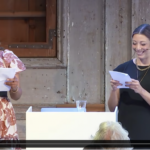
CATO HUNT
SpaceDoctors
[s2If current_user_can(access_s2member_level1)]
[/s2If]
[s2If !is_user_logged_in()]
Join EPIC to access video:
→ Learn about Membership
→ Browse Video Library
[/s2If]
[s2If current_user_is(subscriber)]
Join EPIC to access video:
→ Learn about Membership
→ Browse Video Library
[/s2If]
Our current language of business is no longer fit for purpose. We are all sharply aware of the urgent need to transition into a regenerative economy, yet the words we use are holding us back. We must stop using vocabulary which roots us within a failing system and instead create a new lexicon of resiliency.
By introducing new concepts and metaphors we can redefine organizational success through new values and behaviours which embody the changes we must make.
Our Task
During the conference we ran a 3 day hive mind where we came together to co-create some inspiring new language that supports the principals of regeneration and resilience.
Our Framework
To stimulate conversations we created...





